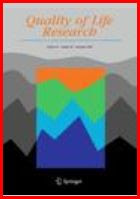
We evaluated personality dimensions captured by an abbreviated 8-item questionnaire and examined associations of the personality traits with health behaviours and subjective well-being (SWB) measures.
The subjects were 11,554 participants in the Kyushu University Fukuoka Cohort Study who completed a self-administered questionnaire inquiring health behaviours, morbidity, personality, and SWB. Personality was assessed by using a questionnaire appeared to capture neuroticism and extraversion traits, and SWB-related variables were assessed with 3 single-item questions.
Neuroticism was negatively and extraversion was positively associated with BMI. Extraversion, but not neuroticism, was positively associated with smoking and alcohol drinking. After multivariate adjustment, neuroticism was strongly associated with each of 3 SWB measures. The multivariate-adjusted odds ratios for the highest versus lowest quintile of neuroticism were 6.09 (95% confidence interval [CI], 5.05–7.33) for perceived stress; 0.21 (95% CI, 0.18–0.25) for good health condition; and 0.26 (95% CI, 0.22–0.31) for life satisfaction. Extraversion showed no clear association with the SWB measures.
The neuroticism and extraversion scales were associated with health behaviours and BMI differently. The neuroticism scale, but not the extraversion scale, was strongly associated with higher perception of stress, poorer perceived health, and lower satisfaction with life in a Japanese population.
Read Full Abstract
Request Reprint E-Mail: joto@phealth.med.kyushu-u.ac.jp
Read Full Abstract
Request Reprint E-Mail: joto@phealth.med.kyushu-u.ac.jp